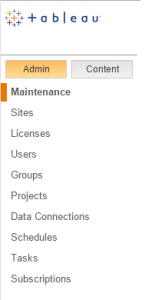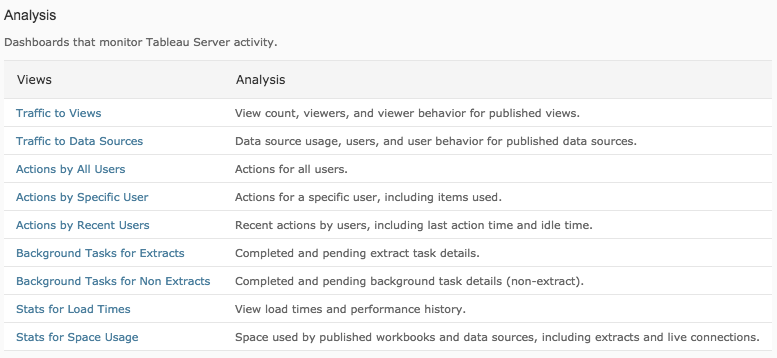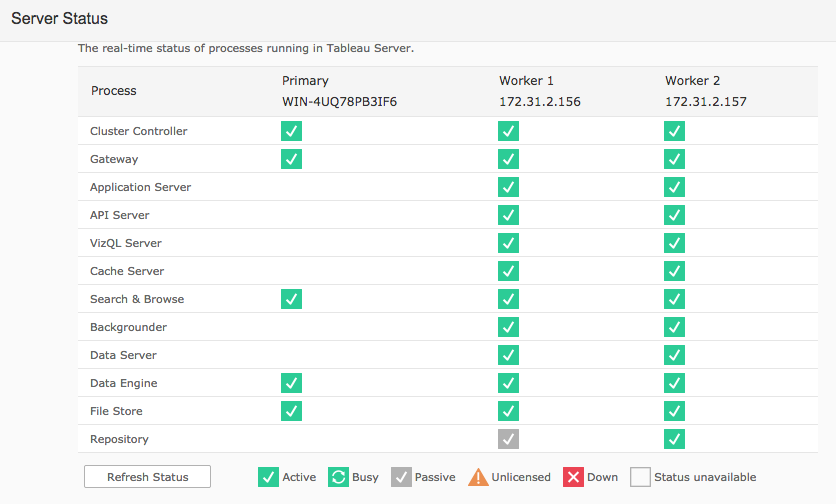Today I’m going to give you a quick run through of the updates and changes you will see in Tableau Server 9.0 from an administrator’s perspective, and what has changed since Tableau Server 8.3
Visual Differences
Firstly and most obviously are the visual changes. Tableau has completely redesigned the GUI, so we now have the options across the bar at the top of the screen instead of down the right hand side… Overall the changes that have been made are a great improvement, which in general means you require fewer clicks to do what you want to do compared to the previous version. So, what looks like this in Tableau v8:
Now looks like this in Tableau v9:
Windows Server 2003 is no longer supported, and the minimum hardware requirements for 64-bit Tableau Server are now set at 4 core, 8GB RAM and 15GB free disk space. Tableau server will not install if these requirements aren’t met.
Tableau Server Activity Analysis
The built in Analysis dashboards have been redesigned so that they now answer direct questions like;
What Is the Total View Count by Day?
What Views Are Seen the Most?
Who Accesses Views Most Often?
This makes finding out how your Tableau Server Environment a little bit easier as it’s now a little bit more intuitive.
Tableau Server Processes
There have been a number of redesigns to how Tableau works, which have increased the number of processes that are being run on the server which you will need to get your head around. Below is the list of new processes and their function
Process |
File Name |
Description |
| API Server | wgserver.exe | Handles REST API calls |
| Application Server | vizportal.exe | Handles the web application, supports browsing and searching. |
| Cache Server | redis-server.exe | Query cache which is distributed and shared across the cluster. Improvement in caching over v8 and reduces the number of query requests made. |
| Cluster Controller | clustercontroller.exe | Responsible for monitoring the various server components, detecting failures, and executing failover when needed. |
| Coordination Service | zookeeper.exe | In distributed installations it is responsible for ensuring there is a quorum for making decisions during failover. |
| File Store | filestore.exe | Replicates data extracts across nodes running Data Engine. |
| Search & Browse | searchserver.exe | Handles fast search, filtering, retrieval, and display of content metadata on the server. |
Cluster Management
Tableau have improved the management of how clustering works within Server. Firstly, the concept of 2-node High Availability cluster has been changed. You can still run Tableau across 2 servers (and spread the load between these two servers), but the loss of one of the servers will bring your Tableau environment down. Therefore the minimum requirement for a true cluster is now 3 servers. You are now able to set the preferred server for the Active Repository, which for instance, is good in the case where the hardware specification is different for each of the servers in the cluster, and you want to ensure that the Active Repository runs on the most powerful server in your cluster. 
You can also initiate a failover of the Active Repository to Standby Repository. This is done using a tabadmin command line interface (See later in the article). This is useful during server maintenance, if you have a requirement to take one of the servers in cluster offline, but want the cluster to remain available. Also, there is no longer the concept of an Active and Standby Data Engine. All Data Engines in the cluster are now active, and there is no longer the limitation of having a maximum of 2 servers running Data Engines. All servers in your cluster can now be Active Data Engine Servers if you require.
Command line updates
A few additions have been made to the command line interfaces.
Tabadmin
tabadmin decommission
Used to prepare Tableau File Store nodes for removal from the distributed environment.
tabadmin failoverrepository –target
Used to failover the active repository to the secondary repository.
tabadmin recommission
Used to revert a decommissioned file store into an active state.
tabadmin reindex
Rebuilds the search index for Tableau Server, if it becomes corrupt or shows incomplete results.
Tabcmd
tabcmd editdomain –id 2 –nickname “new-nickname”
Used to modify the nickname for any domain the server is using.
tabcmd listdomains
Used to display a list of domains used by the server.
REST API
There are 34 new REST API Commands to really fill out this functionality. New commands includes assigning and removing permissions, adding and removing membership, and the ability to publish & download workbooks and datasources. Below is the full list of commands
Tableau 8.3 REST API Commands |
Tableau 9.0 REST API Commands |
| Add Datasource Permissions | |
| Add Project Permissions | |
| Add Tags to Workbook | Add Tags to Workbook |
| Add User to Group | |
| Add User to Site | Add User to Site |
| Add View to Favorites | |
| Add Workbook Permissions | |
| Add Workbook to Favorites | Add Workbook to Favorites |
| Append to File Upload | |
| Create Group | |
| Create Project | Create Project |
| Create Site | Create Site |
| Delete Datasource | |
| Delete Datasource Permissions | |
| Delete Project | Delete Project |
| Delete Project Permission | |
| Delete Site | Delete Site |
| Delete Tag from Workbook | Delete Tag from Workbook |
| Delete View from Favorites | |
| Delete Workbook | |
| Delete Workbook from Favorites | Delete Workbook from Favorites |
| Delete Workbook Permissions | |
| Download Datasource | |
| Download Workbook | |
| Get Users in Group | |
| Get Users on Site | Get Users on Site |
| Initiate File Upload | |
| Publish Datasource | |
| Publish Workbook | |
| Query Datasource | Query Datasource |
| Query Datasource Permissions | |
| Query Datasources | Query Datasources |
| Query Groups | |
| Query Job | |
| Query Project Permissions | |
| Query Projects | |
| Query Site | Query Site |
| Query Sites | Query Sites |
| Query User On Site | |
| Query View with a Preview Image | Query View with a Preview Image |
| Query Views for Workbook | Query Views for Workbook |
| Query Workbook | Query Workbook |
| Query Workbook Connections | |
| Query Workbook Permissions | |
| Query Workbook Preview Image | Query Workbook Preview Image |
| Query Workbooks for User | Query Workbooks for User |
| Remove User from Group | |
| Remove User from Site | Remove User from Site |
| Sign In | Sign In |
| Sign Out | Sign Out |
| Update Datasource | |
| Update Datasource Connection | |
| Update Group | |
| Update Project | Update Project |
| Update Site | Update Site |
| Update User | |
| Update Workbook | |
| Update Workbook Connection |
The Tableau Server Administrator Guide can be found here, and the REST API Documentation can be found here. I hope that you have enjoyed this brief walkthrough of the high level differences between Tableau Server 8 and 9. Please don’t hesitate to get in touch with any comments or suggestions.





